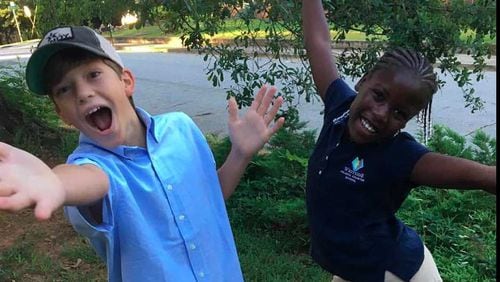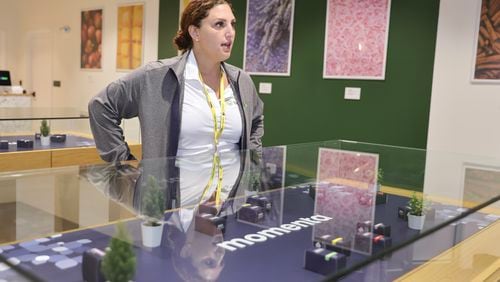Educator Jane Johnston Gilbert grew up in Atlanta. Eight years ago, she and her family relocated from the northside of Atlanta to Grove Park on the westside in search of a more diverse community.
She and her husband have three children, the youngest adopted from Uganda. Two of her children attend Westside Atlanta Charter School, a K-8 charter school that opened in 2013. Her husband serves on the board of the school, which is part of the Atlanta Public Schools.
In this guest column, Gilbert explains what led parents in the community to start Westside and why the charter school is important to her and other parents. By design, Westside Atlanta Charter School is racially and socioeconomically diverse, she says.
Gilbert received an undergraduate degree in education from Vanderbilt and a masters of arts in religion from Reformed Theological Seminary. She taught middle school before staying home for more than 10 years and then returned to teaching at an private school.
By Jane Johnston Gilbert
Of all the anticipated anxieties and heartaches of parenthood, the education of my children seemed safely off the list and relatively straightforward. Once the pre-school years arrived, the simplicity vanished and was quickly replaced with the realities of school options with vastly different philosophies of education, approaches to classroom management and childhood, and my own desires for the type of future adults I hoped to help cultivate in the process. As parents in the socioeconomic middle class with graduate degrees, my husband and I recognized the privilege of choice.
Moving to Atlanta’s westside, we chose the historic neighborhood of Grove Park, an underserved and under resourced neighborhood filled with vibrant, experienced, and wise people. Having lived in Atlanta our entire lives, we became increasingly aware of the extent to which the neighborhoods could be clearly defined by skin color and financial profile. It was becoming increasingly evident to us that living in these self-segregated communities is responsible not only for social anemia, but also means that those in positions of power and influence are not often sharing the problems of those from whom such a voice has been systemically withheld.
When we do not share in the consequences of broken systems, we are rarely motivated to share in their solutions.
Both my husband and I began our careers as educators and know from experience that even within the same classroom, each child has unique requirements in order to flourish academically. Some children need a small community, while others desperately need a larger, more bustling environment.
There are students who come alive in very creative, organic classrooms and others who will come unraveled without strictly adhered to schedules and policies. These needs are not only felt by the affluent who have the resources for educational testing, tutors, accommodations, and therapies, but are just as needed for the success of those children without the means or opportunity for such support. Unfortunately, the self-segregation of neighborhoods is then reflected in many of the neighborhood schools.
Out of a community on the westside that held this deep commitment to education based in research and best practices, and the belief that such opportunities should not be limited only to those who can afford to pay tens of thousands a year, Westside Atlanta Charter School was birthed. It was intentionally placed as close to the center of the 30318 zip code as possible, home to the full spectrum of income levels, ethnicities, and educational backgrounds.
It was founded as a place that might push against the societal disease of homogeneity, fostering a community of learners who are as curious and eager to understand and appreciate differences in one another’s families of origin as they are to explore great literature, to deepen their mathematical understanding, and to grow intellectually.
Sitting in a faculty meeting or a classroom with different perspectives, vastly different life experiences, and, in some cases, contrasting social norms is where as much of the education takes place as in the textbooks and formal lesson plans. More than that, intentionally fostering a deep affection for one another is where these future adults might just change the world.
Such a school doesn’t happen accidentally but began with two years of getting the word out through cookouts in apartment complexes and door-to-door communication with neighbors. There are only 40 seats per grade level, drawing from any household within Atlanta Public School borders, but focusing heavily on the westside.
The school has worked to become a contributing member of the Douglas cluster, the particular grouping within Atlanta Public Schools of traditional schools which feed into Douglas High School. Recognizing that no school has a corner on success and we all have much to learn from each other, Westside shares professional development opportunities with teachers from all the schools in the Douglas cluster and actively reaches out to local daycare facilities, including a strong relationship with the YMCA’s Chattahoochee Early Learning Center.
Our own family has benefitted greatly from Westside Atlanta Charter School’s diversity. My second grader, Ugandan by birth, spends her days at school surrounded by classmates who share her skin color and hair styling demands. She looks around and sees plenty of friends and adults who look like her white family, but she also sees teachers and administrators who look like and affirm her experiences as a child of color.
My sixth-grade biological son is as white as his mother who grew up in Buckhead. But, unlike my childhood, he has the opportunity to spend his hours on the playground, in the classroom, and in the homes of people who don’t look like or view the world exactly as he does. Westside is populated by students who are both highly affluent and who qualify for free and reduced lunch and by an almost equal mix of children who are white and those of color. It is an extraordinary environment in which to study the Civil Rights movement, to discuss in middle school the complexities of current national policy debates, and to celebrate the joy of birthdays and holidays that everyone delights in equally.
This particular privilege of choice has created the opportunity for families of all backgrounds to sample a taste of Martin Luther King Jr.’s vision of beloved community and a greater feast is not easily found.







